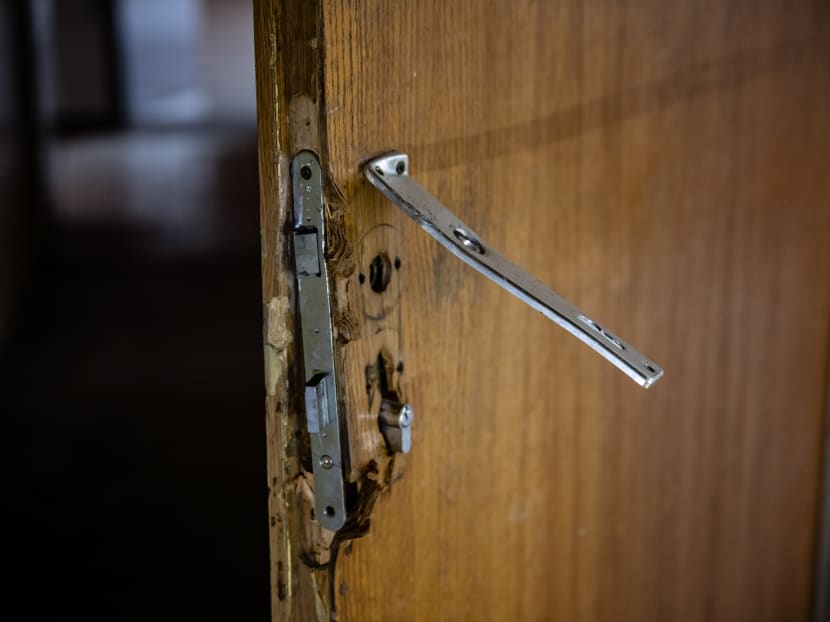Police to be allowed to forcibly enter premises without warrant during emergencies under proposed Bill amendments
SINGAPORE — Police officers may soon be empowered to forcibly enter premises during emergencies to protect persons from injury or death under amendments to the Police Force Act tabled on Monday (July 5).

A proposed amendment in the new Police Force (Amendment) Bill, if passed by Parliament, will allow police officers to enter a home when they hear calls of distress coming from within.
- A new Bill proposes to grant police officers the power to force their way into a home in order to protect people from death or injury
- Currently, only paramedics and firefighters can do so
- Another provision would provide legal protections to police officers if they act in good faith and with reasonable care
- Penalties for evasion of roadblocks to also be raised
SINGAPORE — Police officers may soon be empowered to forcibly enter premises during emergencies to protect persons from injury or death under amendments to the Police Force Act tabled on Monday (July 5).
This power is currently reserved for rescue personnel such as paramedics and firefighters, and police officers who arrive at the scene need to wait for other emergency responders to arrive.
Currently, police officers may forcibly enter premises only if arresting someone, to investigate an arrestable offence, or if they are carrying out a search warrant.
If passed, a proposed amendment in the new Police Force (Amendment) Bill, which was introduced by Minister of State for Home Affairs Desmond Tan, will allow police officers to enter a home when they hear calls of distress coming from within.
Proposed changes to the Police Force Act also spell out legal protections for officers for any act or omission “done in good faith and with reasonable care” when carrying out their duties.
At present, they can rely on the common law defence of necessity.
STIFFER PENALTIES FOR EVADING ROADBLOCKS
If the amendments are passed, motorists who evade roadblocks will face a maximum fine of S$10,000, up from S$5,000.
The maximum imprisonment term for evading roadblocks may also be raised from 12 months to seven years, with the highest penalties given to the most serious cases, such as if the motorist causes grievous hurt to a police officer.
In 2017, two police officers were injured after they chased a driver who dashed past a roadblock along Mackenzie Road.
In addition to raising penalties, the Bill also seeks to expand the definition of roadblock evasion from the current definition of motorists who physically dash through the roadblock.
The definition of “failure to comply with the signal of a police officer”, as spelt out in the Police Force Act, will thus include other forms of evasion, such as motorists who stop their vehicle before the roadblock and escape on foot, reverse their vehicle, or make a U-turn.
OTHER PROPOSED AMENDMENTS
Special police officers, such as full-time national servicemen and volunteer special constabularies, will be given the same “proactive” policing powers as regular officers under the proposed Act, such as the ability to set up roadblocks and disperse crowds. Currently, they are only empowered with investigation powers used when there is a suspected offence.
Commercial affairs officers, who are empowered to investigate commercial and financial crimes, will be given more powers, such as to arrest people who possess stolen items.
The Commissioner of Police will be empowered to delegate his powers, or the powers of the Deputy Commissioner, to civilian officers in leadership positions within the police force.
In times of crisis, a proposed provision will allow the police force to retain regular police officers. If passed, the Commissioner of Police can refuse the resignation notice of any police officer if he believes that their service is necessary for securing public safety and the defence and security of Singapore.
Maximum fines for police officers and special police officers below the rank of inspector who commit disciplinary offences could be raised to up to the equivalent of the wage increment that the officer would, if not for their offences, receive in a period of two years. Currently, offenders below this rank pay a flat fee of S$200.
The fines for volunteer special constabulary officers will also be aligned with the fines for full-time and operationally ready national servicemen (NSmen) and volunteer ex-NSmen.
For auxiliary police forces, such as the essential security services provided by Certis and Aetos, the Bill proposes to add additional reporting and approval requirements for controllers — such as the directors or shareholders — of these companies, with higher penalties for control breaches.











